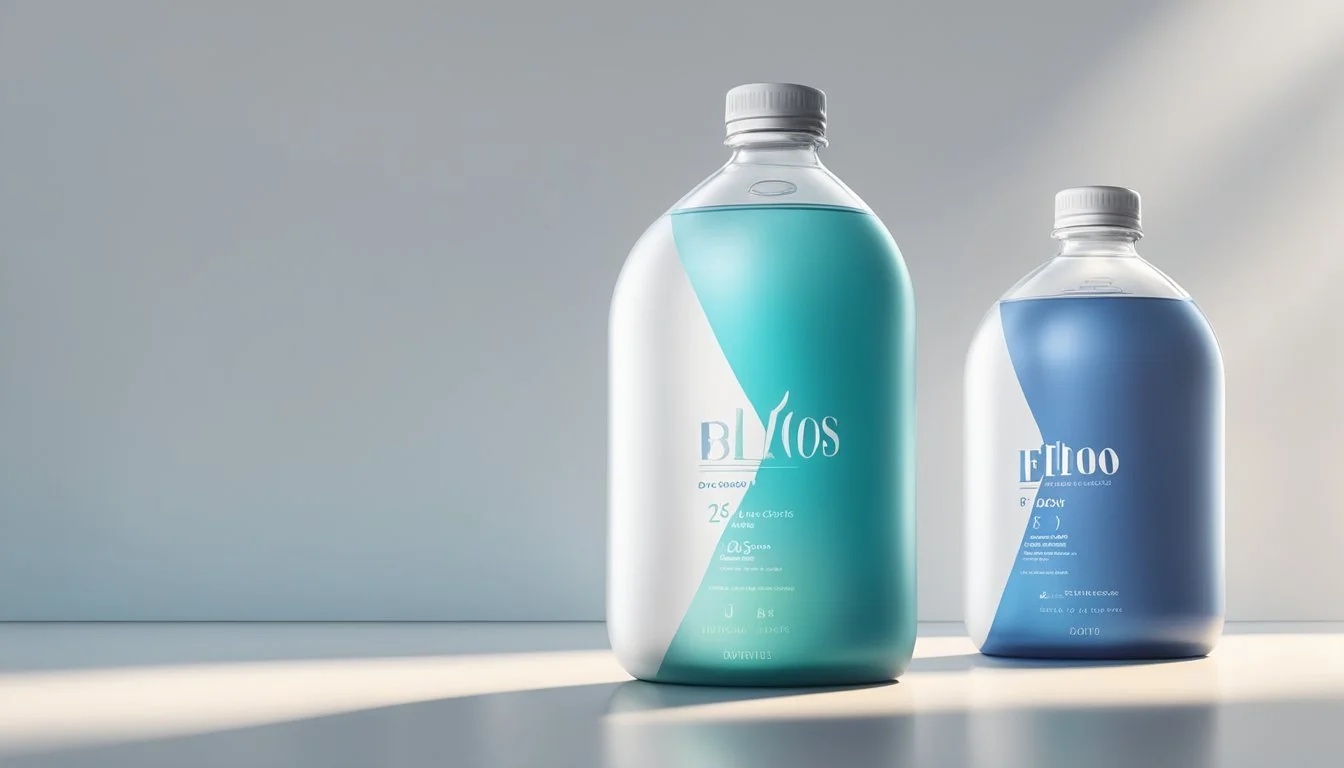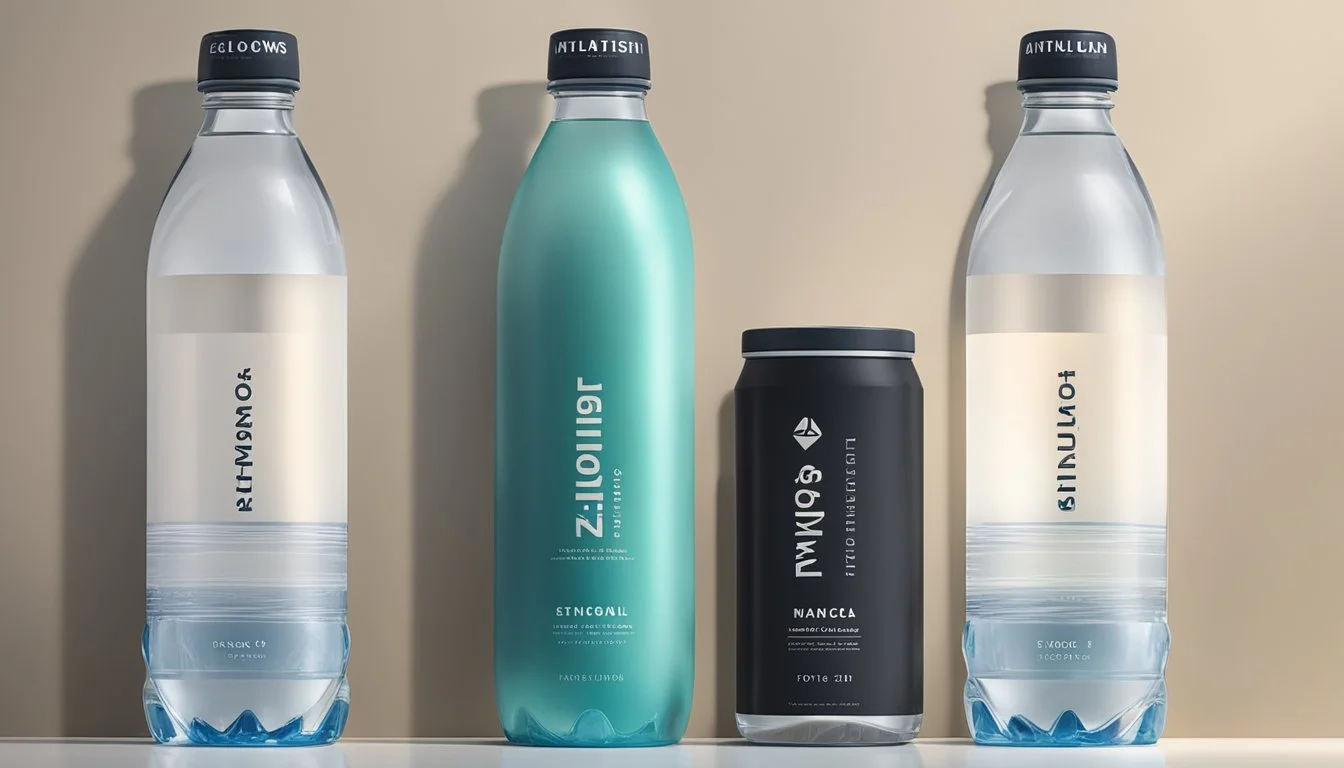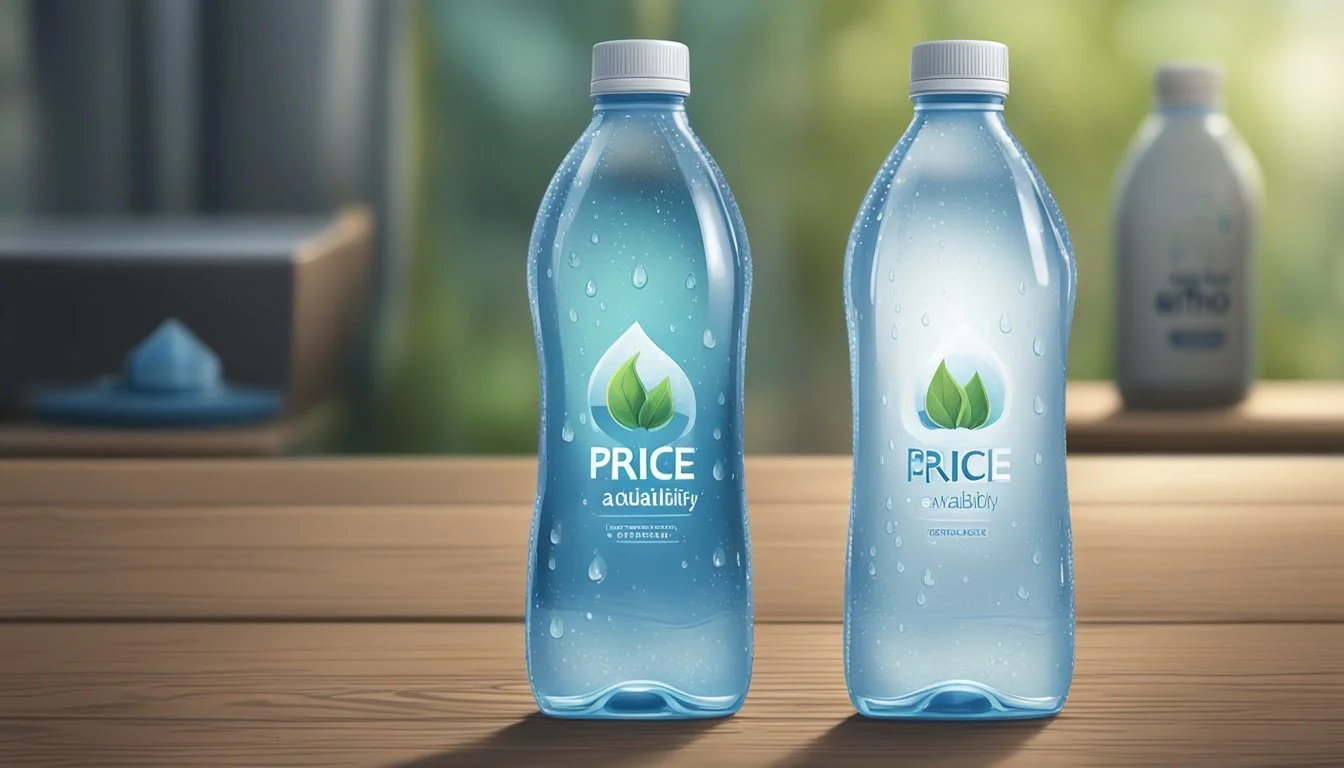Ethos vs. Blk
Comparing Bottled Water Quality and Benefits
When it comes to choosing between Ethos and blk. bottled water, consumers often weigh several factors including taste, health benefits, and social impact. Ethos, owned by Starbucks, is well-known for its commitment to providing clean water access to communities in need. While both brands claim to use recyclable packaging materials, Ethos adds a unique value by contributing to global water initiatives.
Blk. water stands out with its striking black color, a result of the fulvic trace minerals it contains. These minerals are marketed for their potential health benefits, setting blk. apart as a statement beverage. Its distinctive appearance and claimed wellness properties appeal to health-conscious consumers looking for something beyond standard bottled water.
In terms of taste, consumer opinions vary. Ethos is described as having a clean, neutral flavor which makes it a reliable choice for many. Blk., on the other hand, offers a unique drinking experience due to its mineral content, which may alter its taste. For those prioritizing social impact, Ethos is the better choice, while blk.'s appeal lies in its innovative approach to hydration and health.
Comparing Brand Histories
Ethos Water and blk. water have unique beginnings that highlight distinct values and missions. Ethos Water emerged with a strong philanthropic focus, while blk. water gained attention for its innovative approach to hydration with a unique product.
Ethos Water's Philanthropic Origins
Ethos Water was founded in 2002 by Peter Thum and Jonathan Greenblatt. Its mission was to provide access to clean drinking water for people in developing countries. Acquired by Starbucks in 2005, Ethos Water set a goal to donate $10 million to such initiatives by 2010.
Starbucks' backing helped Ethos Water integrate its philanthropic mission into a broader platform, resulting in significant charitable contributions over the years. The company channels a portion of every purchase towards water projects in countries like Kenya, India, and Honduras. This aligns with Starbucks' commitment to corporate social responsibility and its reputation for supporting global health initiatives.
The Emergence of blk. Water
blk. water, introduced in 2011, stands out with its distinctive black color, achieved by infusing the water with fulvic trace minerals. Founded by Canadian entrepreneurs Louise and Jackie Wilkie, blk. water aimed to redefine hydration through advanced mineral enhancement.
The company markets blk. water as not just a hydration solution but also a source of beneficial trace elements. Its rise in popularity can be attributed to its unique aesthetic and the claimed health benefits of fulvic acid. Unlike Ethos, blk. water focuses on innovating within the bottled water industry, catering to consumers looking for novel and health-oriented beverages.
Water Source and Natural Composition
Examining the origins and natural components of both Ethos Water and Blk. Water provides insight into their unique qualities and impacts on health and sustainability.
Ethos Water: From Spring to Bottle
Ethos Water sources its water from natural springs located within protected environments. These springs are often situated in regions abundant with natural beauty and geological significance.
Limestone filtering plays a key role in the purity and mineral content of Ethos Water. This filtering process enriches the water with essential minerals like calcium and magnesium. The careful sourcing and bottling of this spring water ensure that it maintains its clean, crisp taste.
The spring water is transported directly from these pristine locations to bottling facilities, maintaining the integrity and freshness of the water. Ethos Water’s commitment to sustaining its sources and contributing to water initiatives worldwide further reflects its dedication to quality and environmental responsibility.
Blk. Water: Fulvic Trace Minerals and Springs
Blk. Water stands out due to its distinctive infusion of fulvic trace minerals, which not only give the water its unique black color but also add a range of potential health benefits. Fulvic acid, part of these minerals, is known for containing a complex mixture of nutrients.
Mineral content is a significant aspect of Blk. Water's appeal. Its mineral-rich composition is derived from specific natural springs that provide a base for the fulvic trace mineral infusion.
These springs are carefully chosen to ensure high-quality water with a clean and neutral taste before the infusion process. The combination of natural water from springs and the added fulvic minerals results in a product that is not only visually unique but also rich in nutrients. Blk. Water emphasizes transparency in sourcing and purity, ensuring that the water remains free from contaminants.
Health and Hydration Benefits
When comparing Ethos and blk. water, it is essential to consider their health benefits and hydration quality. The focus is on their nutrient composition and adherence to quality standards.
Nutrients and Minerals
Ethos contains a balance of minerals such as calcium and magnesium. These minerals play crucial roles in maintaining bone health and supporting metabolic functions. The water's naturally balanced pH contributes to a smooth taste and potential health benefits.
blk. water, on the other hand, stands out for its infusion of fulvic trace minerals. These trace minerals, including fulvic acid, are organic compounds that may enhance nutrient absorption and support detoxification processes. The unique mineral blend gives blk. water its distinct dark color and potential health-boosting properties.
Hydration and Quality Standards
Ethos is known for its commitment to providing clean drinking water. The brand ensures that its water meets high-quality standards, making it a reliable choice for everyday hydration needs. The balance of minerals in Ethos can aid in optimal hydration and gut health.
Blk. water similarly promotes excellent hydration, but its primary appeal lies in the additional health benefits from its unique mineral content. The brand emphasizes its water's purity and the natural sourcing of its ingredients, which align with high quality standards for bottled water. This focus on both purity and mineral benefits supports a significant hydration experience.
Production Processes
Both Ethos Water and blk. water employ unique production processes aimed at ensuring the purity and quality of their products.
Purification and Filtration
Ethos Water utilizes an intricate reverse osmosis and ultraviolet light treatment to purify its water. The reverse osmosis system removes impurities by forcing water through a semi-permeable membrane, while ultraviolet light helps eliminate potential pathogens.
In contrast, blk. water incorporates a natural filtration method, infusing the water with fulvic and humic acids. These acids are sourced from deep earth deposits and act as natural purifiers, contributing to blk. water's distinct dark appearance and claimed health benefits. The natural filtration process used by blk. water claims to enhance mineral uptake while avoiding synthetic purification methods.
Bottling and Packaging
Ethos Water bottles its purified water in standard plastic bottles designed for convenience and portability. The brand emphasizes the use of recyclable materials to minimize environmental impact. Each bottle from Ethos Water is designed to be lightweight, reducing plastic usage and contributing to broader sustainability goals.
blk. water, on the other hand, also opts for plastic bottles but focuses on aesthetics with its sleek, black packaging. The packaging is intended to reflect the brand's premium positioning and unique product appearance. Both brands adhere to stringent hygiene standards during the bottling to ensure the final product is safe for consumers.
By focusing on their distinct purification and bottling methods, Ethos Water and blk. water carve out their niches in the competitive bottled water market.
Taste and Aesthetic Appeal
The taste and branding of Ethos and blk. Water set them apart in the crowded market of bottled water. These elements are critical for consumers who value both the sensory experience and the visual presentation of their beverage choices.
The Taste Profile
Ethos Water is known for its clean and neutral taste, making it versatile for a wide variety of consumers. It lacks any strong aftertaste, which can be appealing to those who prefer a pure and uncomplicated water flavor. This quality often makes it a reliable choice for hydration without any distractions.
In contrast, blk. Water offers a unique taste experience due to its fulvic mineral content. This gives blk. Water a subtle, almost earthy flavor that some consumers find intriguing while others may see it as an acquired taste. The distinct taste can be either a point of attraction for novelty seekers or a deterrent for traditionalists.
Appearance and Branding
Ethos Water’s branding is closely tied to its philanthropic mission. The packaging is straightforward, featuring plastic bottles with a simple yet effective design. The label includes information about their efforts to provide clean water to communities in need, which appeals to socially conscious consumers.
Blk. Water stands out with its striking visual presentation. The water itself is black due to the fulvic minerals, creating a bold statement. This uniqueness extends to its sleek, black packaging that emphasizes its modern and cutting-edge image. The branding appeals to consumers looking for something different and highlights its purported health benefits.
Price and Availability
Ethos and blk. Water vary significantly in terms of cost and market availability. Examining the price points and ease of access can guide consumers in choosing the better option.
Cost Analysis
Ethos Water is typically priced higher than many bottled water brands. A 500ml bottle of Ethos Water often costs around $1.95. This price reflects its premium positioning due to its commitment to global water programs.
In contrast, blk. Water may also command a higher price. The unique fulvic trace mineral content and black appearance contribute to its premium pricing. Prices can vary but often align similarly with Ethos, making both brands a higher-end choice for consumers.
Market Availability
Both Ethos and blk. Water are accessible through various retail channels, yet their availability might differ. Ethos Water is frequently sold at Starbucks locations, offering convenience for regular patrons. It's also available in select grocery stores and online platforms.
Blk. Water is similarly available in specialty health stores and online, but its striking black color can appeal to niche markets. This specialized appeal might limit its presence in everyday retail outlets. However, the brand’s growing online distribution ensures that consumers can obtain it with relative ease.
Environmental Impact and Sustainability
Ethos and Blk approach sustainability through different practices in sourcing water and the materials they use for packaging. Their efforts in reducing environmental impact, addressing carbon footprints, and promoting recycling stand out.
Water Source Sustainability
Ethos Water aims to source its water in an environmentally responsible manner. They collaborate with regions that are not water-stressed and focus on maintaining local ecosystems. This method aims to lessen the environmental toll of water extraction, aligning with global sustainability goals.
Blk, on the other hand, sources water infused with fulvic minerals. Concerns regarding the sustainability of these sources arise from the special procedures required for extracting and infusing these minerals. Attention is needed to ensure that their sourcing does not lead to environmental degradation.
Bottle Material and Recycling
Ethos uses bottles made from recyclable materials and promotes recycling programs to minimize waste. Significant investments have been made to ensure their bottles are environmentally friendly. Additionally, their partnership with Starbucks aids in amplifying sustainable practices on a larger scale.
Blk also uses recyclable plastic bottles but places a unique emphasis on the black coloring, which can sometimes complicate recycling processes. However, efforts to ensure these materials can be effectively recycled are in place. Both brands strive to reduce their carbon footprint by emphasizing recyclable packaging.
Ethos, with its clear focus on carbon neutrality, and Blk, with its innovative products, both contribute to environmental sustainability. They address recycling, sourcing, and packaging within their environmental impact strategies.
Regulatory Compliance and Safety Standards
Both Ethos and Blk bottled waters must adhere to rigorous standards to ensure safety and quality. These standards cover regulatory guidelines, health considerations, and the minimization of potential contaminants.
Bottled Water Regulations
Bottled water regulations are primarily enforced by the FDA, which mandates that the standards for bottled water must be at least as stringent as those for tap water regulated by the EPA. The FDA oversees everything from the source to the final product, ensuring that bottled water is safe for consumption. Labels must accurately represent the contents, and water must be free from harmful levels of chemicals and contaminants such as BPA, chlorine, and fluoride.
Ethos, committed to social and environmental missions, and Blk, known for its unique fulvic mineral content, both comply with these stringent regulations, ensuring their products are safe. Regular testing and inspections are standard practices for bottled water companies to maintain certification and compliance with FDA standards.
Health and Safety Considerations
Health and safety considerations are paramount in the bottled water industry. Both Ethos and Blk prioritize the elimination of harmful contaminants such as PFAS chemicals, which can pose significant health risks. Regular tests for microbial contaminants ensure the water remains free from pathogens and other contaminants that could cause illness.
Ethos focuses on maintaining a clean and pure taste, adhering strictly to health safety standards. Blk, with its distinct dark hue from fulvic minerals, assures consumers of its safety through rigorous quality controls. The absence of BPA in packaging is also a critical safety measure. Both brands aim to deliver water that not only tastes good but is also safe and beneficial for health.
Comparative Analysis
Ethos and blk. water cater to distinct consumer needs and endure different market perceptions due to their unique attributes and positioning.
Consumer Preferences
Consumers often gravitate towards Ethos for its charitable mission. The brand emphasizes clean water initiatives, which resonates well with socially conscious buyers. Additionally, Ethos bottles are recyclable, adding another layer of eco-friendly appeal.
In contrast, blk. water distinguishes itself with its fulvic trace minerals and deep black hue. It targets those interested in health benefits and novelty. The high-end pricing of blk. water indicates a premium product strategy, appealing to consumers seeking unique hydration experiences.
Expert Insights
Industry experts highlight Ethos for its social impact. The brand's contributions to clean water projects are praised and set it apart among competitors like Fiji and Smartwater. The taste of Ethos, although not exotic, meets satisfactory standards with its purification techniques.
Conversely, experts note the unique selling proposition of blk. water lies in its fulvic acid content. This organic compound offers potential health benefits, making blk. water a focus for those looking to enhance nutrition through hydration. However, the cost premium over other value brands such as Essentia is substantial, positioning it as a high-end option.
More About Ethos
Ethos vs Mountain Valley Spring Water: Which Bottled Water is Better?
Ethos vs Richard's Rainwater: Which Bottled Water is Better?
Ethos vs Whole Foods Italian Still Mineral water: Which Bottled Water is Better?






